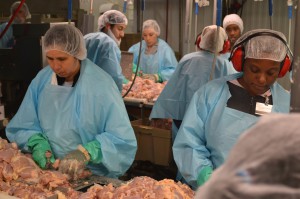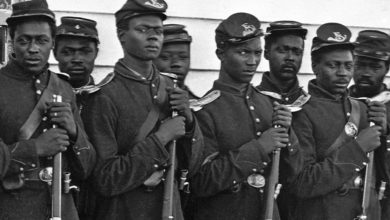 “Uncle Sam provides himself with everything, he owns the forests of factories of all kinds, but is himself obliged to buy all that he manufactures. But where will he put it all? Where will he get his money to go on feeding his factories? What will he do with his millions of workers, who do not stand by to look at the problem, but see that business is rich while they are poor, who want better wages, more security, more respect?”
“Uncle Sam provides himself with everything, he owns the forests of factories of all kinds, but is himself obliged to buy all that he manufactures. But where will he put it all? Where will he get his money to go on feeding his factories? What will he do with his millions of workers, who do not stand by to look at the problem, but see that business is rich while they are poor, who want better wages, more security, more respect?”
José Martí
Many know of the great novel written by Upton Sinclair, The Jungle. Some may have read it in high school or heard it mentioned in passing. It was a novelized, yet journalistic account of conditions at a Chicago meatpacking plant and the way that immigrants were mistreated in the U.S. at the beginning of the 20th century.
One would think that conditions described in this novel from 1906 would not be continuing in the here and now, but to the contrary, a strong parallel can be found in the poultry industry of today.
One of the largest businesses in Arkansas is Tyson, the popular chicken corporation. Headquartered in Springdale, its name is known nationwide. But what is not known are the conditions under which the plant workers labor. In 2013, the Northwest Arkansas Workers Justice Center, with the aid of Food Labor Research Center at the University of California, Berkeley, the Unitarian Universalist Service Committee, Professor Chris Benner at the University of California, Santa Cruz and others, conducted research to release a report on the conditions of workers in the poultry industry in Arkansas. In February, the report was released. (Read the full report here).
Coupled with multiple interviews, the report is a litany of various abuses of workers in the plants. The workers are given an unrealistic workload each day (45 chickens per minute on the line) with infractions for poor performance, to the point where workers are not even allowed to use the restroom, in order to maintain this level of productivity asked of them.
“Women, in particular cite gender discrimination in the way bathroom breaks are withheld by male supervisors. Some have urinated on themselves because they were not granted breaks when needed,” Magaly Licoli, executive director of the NWA Workers Justice center, told Liberation News. There are no paid sick days. Many workers come in even when sick, because of an absurd retaliatory system instituted by the plant, and sick workers dealing with raw chicken is bad for all involved, at the plant and on the consumer end.
In Arkansas the average poultry worker is paid an average of $13.84 an hour–just over the national average of $12.00 an hour–which, after taxes, places all workers in this industry slightly above the poverty line for a single person, that is. They are only granted one set of protective equipment during the entirety of their employment; the workers are responsible for any replacements. Many are paid on predatory pay card systems (that charge money to do almost anything with the card) and those who don’t, regularly receive paychecks that merely have the amount of money owed to the employee, not making any note of how they earned that amount (hours, taxes removed, etc.).
Many are victims of wage theft. Injured workers are usually fired, with workers’ compensation very rarely paid. Complaints have been filed to OSHA, but they say they cannot do anything and to contact the USDA; when the USDA is contacted, they say the issue is a concern for OSHA. In Northwest Arkansas, the poultry plant workers are predominantly Latino/a, in Pine Bluff which is slightly further south, the workers in the poultry plants are mostly Black.
The purpose of the report release is to raise awareness of an issue swept under the rug, to give a voice to those who thought themselves to this point to be voiceless. Ultimately, of course, the goal is for the poultry workers themselves to organize for better wages and conditions, but the report is to bring this to attention of all who fight for a better world for the working class.
The immediate goals are to apply public pressure to reduce the line speed, and to guarantee bathroom breaks and paid sick days. At the moment, it is a fight for the basic dignity of the poultry workers.
It is of course not an easy fight. In regards to the line speed, GOP legislators have been trying to push legislation to increase the line speed from 45 chickens a minute to 54 a minute. Through its various investment in certain institutions, Tyson is using “philanthropy” to buy the silence of many. And of course, Tyson is not happy with the report itself and is pushing back against the oncoming tide of action for justice.
Organizers and advocates of the working class see the possibilities in fighting against the injustices reminiscent of The Jungle. This nascent organizing is letting large corporations like Tyson know that they cannot treat oppressed peoples as though they are disposable. As poultry workers stand up for dignity the message is clear: there’s no turning back.






